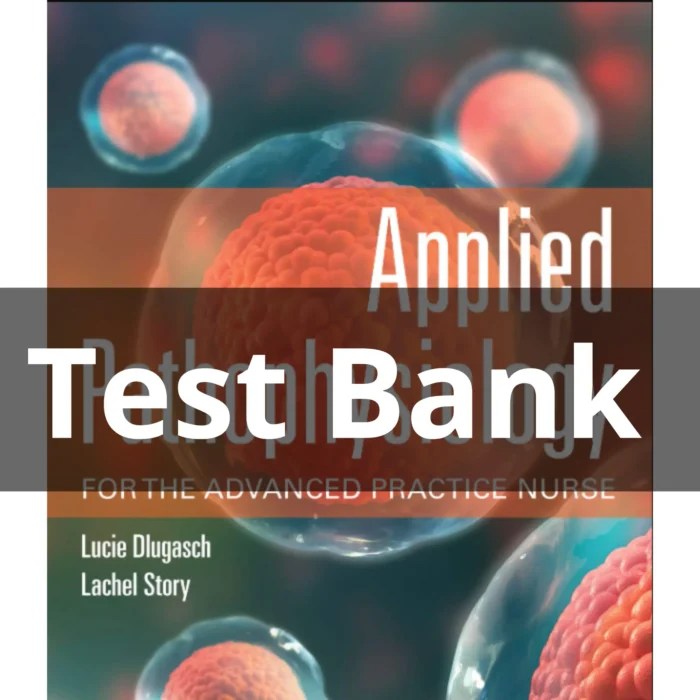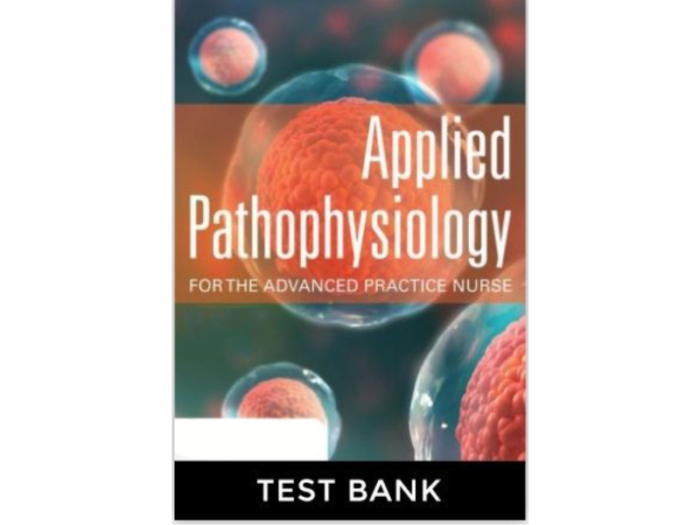Advanced pathophysiology for nurse practitioners test bank – Welcome to the definitive resource for advanced pathophysiology for nurse practitioners! Our meticulously crafted test bank empowers you to excel in your exams and confidently navigate the complexities of patient care. Immerse yourself in a world of pathophysiology, where theory meets practice, equipping you with the knowledge and skills to make informed clinical decisions and improve patient outcomes.
This comprehensive guidebook delves into the core principles and concepts of advanced pathophysiology, providing a solid foundation for understanding the intricate mechanisms of disease processes. With real-world case studies and clinical applications, you’ll gain invaluable insights into how pathophysiology manifests in actual patient scenarios.
1. Advanced Pathophysiology for Nurse Practitioners

Advanced pathophysiology is a specialized area of study that focuses on the intricate mechanisms and processes underlying disease and injury. For nurse practitioners (NPs), understanding advanced pathophysiology is crucial as it provides the foundation for comprehensive patient care and evidence-based practice.
This advanced understanding enables NPs to assess and diagnose health conditions more accurately, predict potential complications, and develop tailored interventions to improve patient outcomes.
Key Principles and Concepts
- Cellular and molecular mechanisms of disease:NPs explore the cellular and molecular pathways involved in disease development, including genetic, biochemical, and immunological processes.
- Systemic pathophysiology:They examine how different organ systems interact and are affected by disease, considering the interconnectedness of the body.
- Environmental and lifestyle factors:NPs recognize the role of environmental and lifestyle factors in the pathogenesis of disease, such as diet, smoking, and exposure to toxins.
- Pharmacological and non-pharmacological interventions:They understand the mechanisms of action and potential side effects of medications, as well as the use of non-pharmacological interventions, such as lifestyle modifications and complementary therapies.
Clinical Applications
- Accurate diagnosis and differential diagnosis:Advanced pathophysiology helps NPs distinguish between similar symptoms and identify underlying causes of disease.
- Prediction and management of complications:By understanding the pathophysiological basis of complications, NPs can anticipate potential risks and implement preventive measures.
- Individualized patient care:NPs tailor treatment plans based on the specific pathophysiology of each patient, considering their unique genetic makeup, lifestyle, and environmental factors.
- Patient education and counseling:NPs effectively communicate the pathophysiology of disease to patients, empowering them to make informed decisions about their care.
2. Test Bank

The test bank provides a comprehensive collection of questions designed to assess NPs’ knowledge, comprehension, and application of advanced pathophysiology concepts.
Question Formats
- Multiple choice:Questions with multiple answer choices, requiring the selection of the most correct or appropriate option.
- True/False:Questions that present a statement as true or false, requiring a binary response.
- Short answer:Questions that require concise written responses, testing specific knowledge or understanding.
- Case studies:Questions that present real-world clinical scenarios, requiring NPs to apply their pathophysiology knowledge to analyze and solve problems.
Answer Keys and Rationales
Each question is accompanied by a detailed answer key and rationale, providing clear explanations and references to support the correct answer.
3. Case Studies and Clinical Applications

Case studies offer valuable insights into the practical application of advanced pathophysiology in clinical settings.
Clinical Decision-Making Tools
- Pathophysiology-based algorithms:NPs use algorithms that guide them through the decision-making process, considering the underlying pathophysiology of the patient’s condition.
- Clinical prediction rules:NPs apply rules based on pathophysiological principles to predict the likelihood of specific outcomes or complications.
- Risk assessment tools:NPs utilize tools that identify patients at risk for developing certain diseases or complications, based on their pathophysiological profile.
Improved Patient Outcomes
- Early detection and intervention:Advanced pathophysiology knowledge enables NPs to detect and intervene early in the disease process, preventing complications and improving outcomes.
- Tailored treatment plans:NPs design individualized treatment plans that target the specific pathophysiological mechanisms underlying the patient’s condition, leading to better outcomes.
- Reduced healthcare costs:By preventing complications and improving overall patient health, advanced pathophysiology knowledge contributes to reduced healthcare costs.
4. Teaching and Learning Resources: Advanced Pathophysiology For Nurse Practitioners Test Bank

To enhance the understanding and application of advanced pathophysiology, various teaching and learning resources are available.
Interactive Learning Modules, Advanced pathophysiology for nurse practitioners test bank
- Simulations:Realistic simulations allow NPs to experience clinical scenarios and apply their pathophysiology knowledge in a safe and controlled environment.
- Case-based learning:NPs engage with real-world case studies to analyze and solve problems, applying pathophysiology principles.
- Interactive quizzes:Quizzes provide immediate feedback on NPs’ understanding of key pathophysiology concepts.
Study Guides and Review Materials
- Comprehensive study guides:Guides summarize key concepts, provide practice questions, and offer additional resources for further study.
- Review articles:Articles present concise overviews of specific pathophysiology topics, including recent research and clinical implications.
- Online resources:Databases, textbooks, and websites offer access to a wealth of information and educational materials.
Quick FAQs
What is the scope of advanced pathophysiology for nurse practitioners?
Advanced pathophysiology encompasses the in-depth study of disease processes, their underlying mechanisms, and their impact on patient health. It provides a comprehensive understanding of the physiological and biochemical alterations that occur in various disease states.
How is advanced pathophysiology applied in clinical practice?
Advanced pathophysiology serves as a cornerstone for clinical decision-making. By understanding the pathophysiology of a particular disease, nurse practitioners can accurately diagnose, develop effective treatment plans, and anticipate potential complications.
What are the benefits of using a test bank for advanced pathophysiology?
A comprehensive test bank offers numerous benefits, including self-assessment, knowledge reinforcement, and exam preparation. It provides a structured approach to reviewing key concepts and identifying areas for improvement.